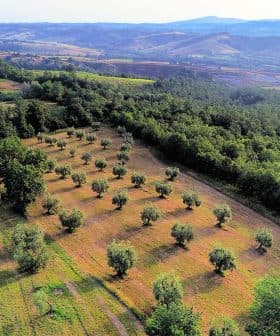Europe Challenges US Tariffs on Spanish Olives
The E.U. has filed a complaint with the World Trade Organization, but the short-staffed trade entity faces a massive backlog. Spanish olive producers face an uncertain future with a December 2019 deadline looming.
 Photo courtesy of the WTO.
Photo courtesy of the WTO.The European Union is challenging the tariffs imposed by the United States on Spanish olive imports by taking the issue to the World Trade Organization, seeking consultations with the U.S. to resolve the dispute within 60 days. The U.S. Department of Commerce imposed anti-dumping and anti-subsidy tariffs on Spanish olives last year, leading to a decline in table olive exports and sparking a legal battle between the E.U. and the U.S.
The European Union is taking legal action against tariffs imposed by the United States on Spanish olive imports by seeking adjudication from the World Trade Organization.
We welcome the decision of the European Commission with great interest. The tariffs imposed on the Spanish olives in the U.S. are not justified and go against the rules of the WTO.
The U.S. Department of Commerce (DOC) imposed anti-dumping tariffs ranging from 16.88 to 25.50 percent and anti-subsidy tariffs ranging from 7.52 to 27.02 percent on Spanish olives last July.
See Also:Olive Oil Imports and Exports“The duties imposed by the United States on black olives from Spain are unjustified, unwarranted and go against the rules of the World Trade Organization,” Cecilia Malmström, the European Commissioner for Trade, said in a Tweet. “Tomorrow, we are taking this case to the WTO dispute settlement system, requesting consultations with the U.S.”
From the Commission side, we have already raised this case with our US counterparts at many occasions. Together with Spanish authorities, we will continue to vigorously defend the interests of EU producers. 2/2
— Cecilia Malmström (@MalmstromEU) 28 de enero de 2019
Under WTO rules, the two sides now have fewer than 60 days to try and settle the dispute. If the two sides cannot come to an agreement after that period of time, the E.U. may ask the WTO to make a ruling on the matter.
Malmström said that the E.U. has repeatedly broached the subject with U.S. trade officials, but been unable to come to an agreement.
“From the Commission side, we have already raised this case with our U.S. counterparts at many occasions,” she said. “Together with Spanish authorities, we will continue to vigorously defend the interests of E.U. producers.”
Luis Planas, the Spanish Minister of Agriculture, Fisheries and Food, welcomed the move after a meeting in Brussels with the European Commission.
“It’s good news. The European Commission is taking the unfair trade restrictions that the table olives are suffering to the WTO,” he said in a Tweet. “The sector deserves it. They have my total support.”
The U.S. imported about $70 million of table olives from Spain last year.
The tariffs came about after two California companies filed an anti-dumping complaint with the U.S. International Trade Commission (ITC). This finding coincided with the conclusions of a DOC investigation that said Spanish olive growers unfairly benefited from the European Common Agricultural Policy (CAP), which provides financial aid to farmers.
Neither the DOC nor the ITC have commented on the E.U.’s decision to file a complaint with the WTO. However, when the tariffs were first announced in July, an ITC spokeswoman said that both departments had determined Spanish olives had a “material advantage” over U.S.-grown olives, which is why the tariffs were implemented.
According to the Spanish Association of Olive Exporters, table olive exports had already fallen by 72 percent just two months after the tariffs were formally implemented in August 2018.
José María Castilla Baró, who represents the Spanish Farmer’s Union (ASAJA) in Brussels, told Forbes that the CAP is in line with WTO rules.
“We welcome the decision of the European Commission with great interest,” he said. “The tariffs imposed on the Spanish olives in the U.S. are not justified and go against the rules of the WTO.”
As olive growers and exporters wait for the WTO ruling in anticipation, the European Commission has announced a grant totaling €2.5 million ($2.85 million) for those affected by the tariffs in order to “seek alternative markets.”
Castilla Baró is happy for the support and also optimistic that the E.U. will win the case, but as several trade experts have warned, it might not be so simple.
The administration of U.S. President Donald J Trump fundamentally opposes the idea of the WTO and, as a result, has already blocked the reappointment of four of the organization’s seven appeals judges.
With only three judges left – the minimum number required for the organization to decide cases – the already backlogged appeals process is moving slowly.
The terms of two more judges are also set to end in December 2019 and, with the U.S. expected to block nominations to those positions as well, experts predict that Spanish olive producers will be left with no solutions and hefty tariffs for the foreseeable future.









